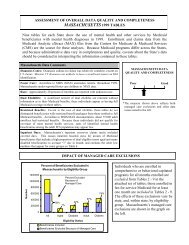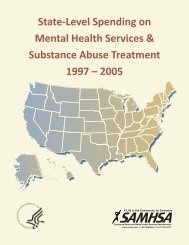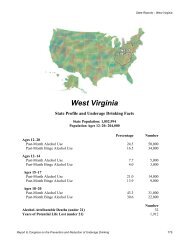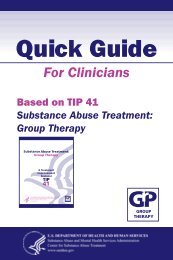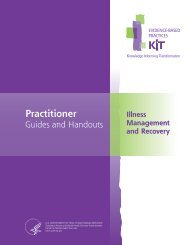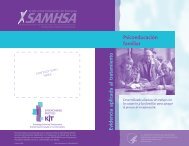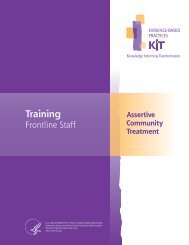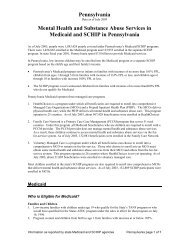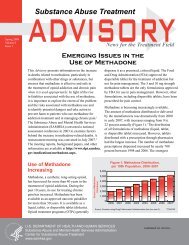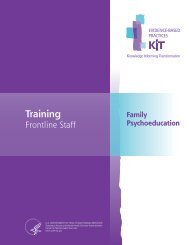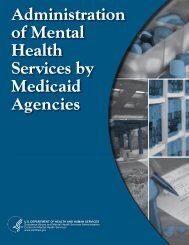Evaluation Findings - SAMHSA Store - Substance Abuse and Mental ...
Evaluation Findings - SAMHSA Store - Substance Abuse and Mental ...
Evaluation Findings - SAMHSA Store - Substance Abuse and Mental ...
Create successful ePaper yourself
Turn your PDF publications into a flip-book with our unique Google optimized e-Paper software.
Figure 2: Timeline of System of Care Funding <strong>and</strong> Phases of the National <strong>Evaluation</strong><br />
1994 1995 1996 1997 1998 1999 2000 2001 2002 2003 2004 2005 2006 2007 2008 2008 2010 2011 2012<br />
2013<br />
4 Grantees Funded in 1993 <strong>and</strong> 18 in 1994<br />
<strong>Evaluation</strong> Phase I<br />
9 Grantees Funded in 1997<br />
<strong>Evaluation</strong> Phase II<br />
14 Grantees Funded in 1998<br />
<strong>Evaluation</strong> Phase II<br />
22 Grantees Funded in 1999 <strong>and</strong> 2000<br />
<strong>Evaluation</strong> Phase III<br />
18 Cooperative Agreements Funded in 2002<br />
<strong>Evaluation</strong> Phase IV<br />
7 Cooperative Agreements Funded in 2003 <strong>and</strong> 4 in 2004<br />
<strong>Evaluation</strong> Phase IV<br />
25 Cooperative Agreements Funded in 2005 <strong>and</strong> 5 in 2006<br />
<strong>Evaluation</strong> Phase V<br />
System of care communities are diverse with<br />
respect to their catchment areas. Some<br />
systems of care are located in high-risk postal<br />
ZIP code neighborhoods <strong>and</strong> others are<br />
statewide initiatives. The 81 sites addressed<br />
in this report include about 9 percent<br />
neighborhood-based initiatives, 41 percent<br />
single county-wide initiatives, 27 percent<br />
multi-county initiatives, 5 percent statewide<br />
initiatives, <strong>and</strong> 12 percent tribal initiatives.<br />
About 41 percent of the communities are<br />
largely urban, 32 percent are largely rural,<br />
<strong>and</strong> about 27 percent are an<br />
urban/suburban/rural mix.<br />
Studies of the National<br />
<strong>Evaluation</strong><br />
The national evaluation consists of core <strong>and</strong><br />
special studies. The descriptive core study<br />
provides demographic information on the<br />
children, youth, <strong>and</strong> families served by<br />
funded systems of care, whereas the<br />
longitudinal core study provides an<br />
assessment of changes over time in clinical<br />
<strong>and</strong> other outcomes of children, youth, <strong>and</strong><br />
families. For these two studies, data are<br />
collected from youth <strong>and</strong> caregivers who<br />
agree to participate in the evaluation starting<br />
at intake into the program, <strong>and</strong> occurs at 6-<br />
month intervals over a number of years (from<br />
intake to 36 months). This longitudinal<br />
approach enables the national evaluation to<br />
examine clinical <strong>and</strong> functional outcomes for<br />
children <strong>and</strong> youth, <strong>and</strong> family <strong>and</strong> caregiver<br />
outcomes, across time.<br />
Other core studies examine the development<br />
<strong>and</strong> implementation of mental health services<br />
infrastructure <strong>and</strong> service delivery systems<br />
based upon the system of care philosophy<br />
<strong>and</strong> principles, <strong>and</strong> the long-term<br />
sustainability of such systems. Still others<br />
examine the services provided to children,<br />
youth, <strong>and</strong> families <strong>and</strong> the costs of those<br />
services, <strong>and</strong> the service experience of<br />
families.<br />
Studies on special topics include, but are not<br />
limited to, examinations of cultural<br />
competence in the structure <strong>and</strong> provision of<br />
services, the use of evidence-based practices<br />
<strong>and</strong> treatments, <strong>and</strong> the role of primary care<br />
health providers in the mental health care<br />
system. Within the context of these studies,<br />
the national evaluation has addressed<br />
emerging needs of the program related to<br />
evidence-based practice, the development of<br />
practice-based evidence, provider practices,<br />
collaboration between pediatricians <strong>and</strong><br />
mental health providers in systems of care,<br />
<strong>and</strong> comparisons between children <strong>and</strong> youth<br />
The Comprehensive Community <strong>Mental</strong> Health Services for Children <strong>and</strong> Their Families Program <strong>Evaluation</strong> <strong>Findings</strong><br />
2006–2008 Annual Report to Congress ● Page 5



